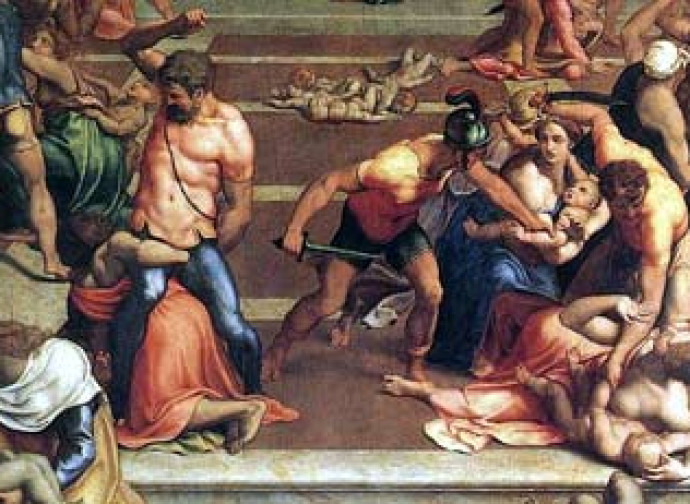Holy Innocents
Their celebration appears in all Eastern and Western liturgical calendars and dates back to at least the 4th century.

The Church venerates as martyrs, with the name of Holy Innocents, the children up to two years old in the Bethlehem area, whose killing was ordered by Herod with the intent to eliminate Jesus. In fact, Herod had been informed of Jesus' birth by the Magi, come from the East to Jerusalem to find the new-born "king of the Jews": they wished to worship him because they had seen the star rise. This event is narrated in the Matthew's Gospel (Mt 2: 1-18), where the massacre of the innocent is seen as the fulfilment of Jeremiah's prophecy: "A voice is heard in Ramah, lamenting and weeping bitterly: it is Rachel weeping for her children, refusing to be comforted because they are no more."
The child Jesus was saved because an angel had warned Joseph in a dream, ordering him to flee to Egypt. Again in a dream, the Magi had been advised not to return to Herod, who feared having his throne usurped (he was the first foreign king of Judea after centuries of Jewish succession, in turn a sign of the fullness of the times and fulfilment of a prophecy from Genesis): in fact, to remain in power, he had not hesitated to kill his wife, three of his children and hundreds of opponents.
The Holy Innocents are therefore the first fruits of all the redeemed men and women who over the centuries would shed their blood for Jesus Christ: flores martyrum, as the poet Prudentius wrote. For this reason, the Church wanted to celebrate them at a date close to Christmas, as comites Christi, that is, among the "companions" closest to the Saviour, who "testify to Christ not with words, but with blood" and "remind us that martyrdom is a free gift from the Lord"(Roman Missal). From innocent victims they thus participate in the eternal glory of the Lamb. Their martyrdom is linked to a salvific mystery that makes sense only to those who look with faith at Christ Crucified and Risen, who judges and overcomes evil not according to the world but by His divine, inscrutable plan. This plan includes a promise: "Whoever loses his life for my sake will find it" (Mt 10:39).
Their celebration appears in all Eastern and Western liturgical calendars and dates back to at least the 4th century, attested in the Carthaginian Calendar and later included in the Leonian Sacramentary. The Carthaginian bishop Saint Quodvultdeus († 454), a name that literally means "What God wants", thus said of the Innocents: "O wonderful gift of grace! What merits have these children had to win in this way? They don't speak, yet already confess Christ! They are not yet able to face the struggle because they are not yet moving their limbs, and yet they are already carrying the palm of victory triumphantly."
The Holy Innocents remind us of the boundless dignity of children in the eyes of Christ and his Church, in a world that rejects God and tramples on children's dignity through various forms of legitimised violence. In this sense we can remember as prophetic the decision of the archbishop of Milan, the blessed Ildephonsus Schuster who, on 28th December 1936, consecrated the altar of the church of San Giuseppe at the Mangiagalli clinic to the Holy Innocents. Mangiagalli is a clinic where, four decades later, the first authorised abortions were performed in Italy. Since then, the violation of innocence through State norms has been relentless, tracing a deadly path common to many Western countries, now allowing the euthanasia of disabled children and the indoctrination of children through ideologies – such as the gender theory, which denies the male and female identity and the essentiality of a mother and father.
We ask the Holy Innocents, who already share in the beatific vision, to look after today's children. We ask them to intercede for mankind to recognise and plead forgiveness for the sins against the little ones, which more than any others can move the divine Justice.
Patrons of: children
